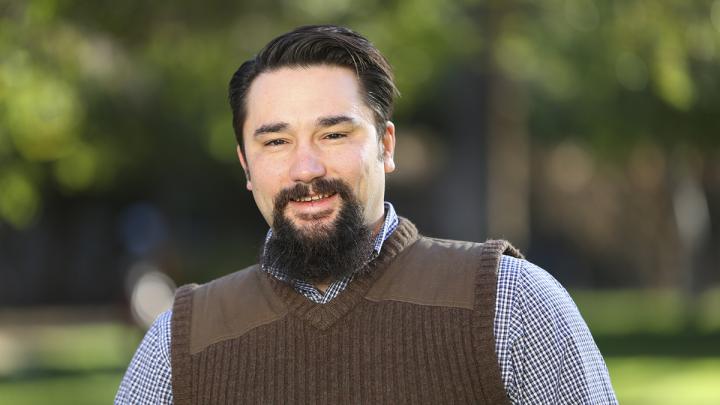
Credit: Mary Zhu
Gary Moore, assistant professor in ASU’s School of Molecular Sciences and the Biodesign Institute’s Center for Applied Structural Discovery has just been named one of 14 young faculty nationwide to be honored with a 2020 Camille Dreyfus Teacher-Scholar Award by the Camille and Henry Dreyfus Foundation.
The Camille Dreyfus Teacher-Scholar Awards Program supports the research and teaching careers of talented young faculty in the chemical sciences, and, when choosing its teacher-scholars, the foundation seeks those who demonstrate leadership in both research and education. As a Camille Dreyfus Teacher-Scholar, Moore will receive an unrestricted research grant of $100,000. Since its inception in 1970, the Teacher-Scholar program has awarded over $45 million to support emerging young leaders in the chemical sciences.
“Gary Moore and his group are doing truly innovative molecular science to address societally important problems in energy conversion and for the production of industrially important materials. They build multifunctional nanoscale materials that work at hard/soft matter interfaces to catalyze a wide range of useful chemical processes,” said Ian Gould, interim director of the School of Molecular Sciences, which is part of The College of Liberal Arts and Sciences. “In recent years the junior faculty members in the School of Molecular Sciences have had an extraordinary record of achievement, and professor Moore is an exemplar in this regard.”
“I am honored to receive this support from the Camille and Henry Dreyfus Foundation, and look forward to making continued contributions to advancing knowledge and education in the chemical sciences,’ said Moore.
Moore is also a Julie Ann Wrigley Global Institute for Sustainability Scholar and guest faculty at Berkeley Lab. He received his doctorate from ASU under professor Ana L. Moore (SMS) in 2009 then spent two years as a Camille and Henry Dreyfus Energy Fellow at Yale University working with Gary W. Brudvig and Robert H. Crabtree before starting an independent research career at Lawrence Berkeley National Laboratory.
Moore’s group uses chemistry to build nanoscale materials that are fundamentally interesting and address societal challenges. Research themes include the transduction of solar energy, the synthesis of new materials to catalyze a range of chemical transformations of industrial importance, the design and preparation of novel hard-to-soft matter interfaces, and development of a general improvement in our understanding of molecular structure and function relationships.
The materials and chemical assemblies developed in Moore’s laboratory resemble components of natural biological systems that carry out similar chemical processes. Thus, nature often provides inspiration and design considerations for the structures they build and the chemistries they develop. Conversely, the artificial constructs offer opportunities to better understand the detailed mechanisms of their biological counterparts.
Moore has a passion for chemistry that is evident from the very first classes students take with him. He lectures on technical concepts in a logical and effective manner, and also addresses scientific topics in a context which brings students a level of cultural relevance to the subject matter that is rarely found in chemistry classes.
Since joining ASU, Moore has developed and taught a new course entitled Solar Energy Conversion. The course covers topics in photoelectrochemical processes and techniques. Integrating core chemistry concepts with societal applications provides motivation for active learning.
The ideal adviser has to be someone with not just knowledge and expertise, but also a passion for mentoring and a personal interest in the welfare of the students being overseen. This individual must be ready to share wisdom, knowledge, and professional experiences, as well as technical expertise. It cannot be emphasized too much that, for graduate students, mentoring and advice are critical movers of the entire graduate program. They have a direct impact on how well students perform in their projects and how efficiently they can earn their degrees.
###
The Camille and Henry Dreyfus Foundation is a leading nonprofit organization devoted to the advancement of the chemical sciences. It was established in 1946 by chemist, inventor, and businessman Camille Dreyfus in honor of his brother Henry. The Foundation seeks to support the advancement of chemistry, chemical engineering, and related sciences as a means of improving human relations and circumstances around the world.
Media Contact
Jenny Green
[email protected]




